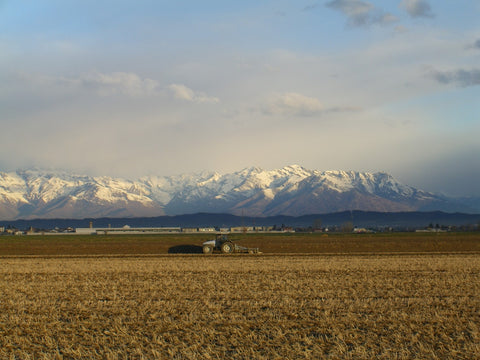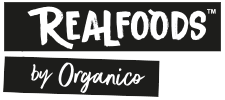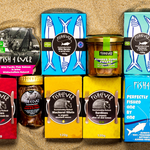You have no items in your shopping cart.
At a time when we’re facing major global environmental challenges, the potential for organic agriculture to help transform the health of our planet shouldn’t be underestimated. The reasons for choosing organic go far beyond individual health concerns regarding exposure to pesticides and other chemicals. Organic farming is an important part of the solution to the climate and biodiversity crisis. It’s better for farm animals, wildlife and for the soil upon which we all depend.
1. Better for the Planet
“Organic agriculture is a production system that sustains the health of soils, ecosystems and people. It relies on ecological processes, biodiversity and cycles adapted to local conditions, rather than the use of inputs with adverse effects. Organic Agriculture combines tradition, innovation and science to benefit the shared environment and promote fair relationships and a good quality of life for all involved.” Definition of Organic Agriculture, IFOAM – Organics International
Organic farming is a holistic approach that works with, rather than against, natural systems. The use of manufactured chemicals and fertilisers is restricted, lowering the risk of environmental pollution and helping to reduce greenhouse gas emissions. It’s estimated that if Europe’s farmland all followed organic principles, agricultural emissions could drop by 40-50%, with plenty to feed the growing populations healthy diets. 1,2

2. Better for Soil
Looking after soil health is fundamental to looking after the health of the planet. Did you know that soils store more carbon than the atmosphere and all of the world’s plants and forests combined? 3 Soils also store 65% of the world’s freshwater. 4 And healthy topsoil is essential for growing food - around 95% of our food production relies on soil. 5
Over the last 40 years, almost a third of the world’s arable soils have been lost to erosion or pollution. 6 The UK alone has lost 84% of its fertile soil since 1850, with erosion continuing at 1cm-3cm a year. 7 Given this soil crisis, the way our agricultural systems affect the soil is hugely important. Organic methods of agriculture that encourage natural and sustainable soil fertility through methods such as composting and crop rotation are essential for building healthy, living soils, full of important microbes. These methods negate the need for energy-hungry synthetic fertilisers and aim to maintain the long-term health of the soil.
3. Better for Wildlife
Organic farms are also important havens for wildlife. They are home to 30% more species of wildlife on average 8 and have around 50% more bees, butterflies and other pollinators. 8 This is great news for wildlife conservation!
Pollinators are an extremely important part of the food production process. Around three-quarters of our food crops depend on pollinators including many fruits, nuts and berries. We get 90% of our vitamin C, the majority of vitamin A, folic acid, and lots of important antioxidants from plants that rely on animal pollination. 9 Shockingly, a major global report states that insects could vanish within a century, due mainly to intensive farming - particularly the heavy use of pesticides 10. By choosing organic, you’re helping to support pollinator-friendly practices that are essential for the future of sustainable food production.

4. Better for Farm Animals
Animal welfare is an important aspect of organic farming. The Soil Association has the highest standards for animal welfare in the UK. 11 It insists that animals are given plenty of space and fresh air and that they are raised in conditions that suit their natural behaviour. 12 The Soil Association standards also stipulate that animals are fed a natural, organic and completely GM-free diet and that animals are able to satisfy their natural behaviours such as grazing, rooting, dustbathing and perching.
5. Food You Can Trust
Organic foods are regulated according to strict standards. For a food product to be labelled as organic, every step in the supply chain, from farmers and packers to food processors and shops that sell organic produce, must meet organic standards and prove it to an organic certification body, like the UK Soil Association.
A certified organic label provides a guarantee that your products have been produced to some of the highest environmental standards. And if you’re concerned about the potential negative effects of pesticides, additives, preservatives and GM then choosing organic food is an easy way to limit your exposure. 13

A ‘Whole Systems’ Approach
All of the above reasons for choosing organic are important in their own right but the real strength of organic agriculture lies in its “whole systems” approach to farming and food production. This means farming in a way that aims to support our whole food system, from soils and farm animals to the health of people, nature and the planet. It’s important that we recognise the interrelationships between all parts of the food production process and the need to adopt a holistic approach. As organic pioneer Eve Balfour wrote in her 1943 book The Living Soil, “The health of soil, plant, animal and man is one and indivisible”.
When we choose to buy organic we are helping to shape the landscape of the entire food system - land, air, water and the lives of farmers and their animals. Switching wherever you can to organic items is a great way to support organic farming and help make positive changes to our food and farming systems.
References:
- Poux, X., Aubert, P.-M. (2018). An Agroecological Europe in 2050: Multifunctional Agriculture for Healthy Eating. Findings from the Ten Years For Agroecology (TYFA) modelling exercise, Iddri-AScA, Study N°09/18, Paris, France, 74 p
- Poux, X., Aubert, P.-M. (2019) Agroecology and Carbon Neutrality in Europe
- Ontl, T. A. & Schulte, L. A. (2012) ‘Soil Carbon Storage’ Nature Education Knowledge 3(10):35
- G. Sposito (2013) Green water and global food security. 12, 0 doi: 10.2136/vzj2013.02.0041
- UN Food and Agriculture Organisation (2015), Healthy Soils are the Basis for Healthy Food Production. Available online at http://www.fao.org/3/i4405e/i4405e.pdf
- Cameron, D. et al (2015) ‘A sustainable model for intensive agriculture’ Grantham Centre briefing note, December 2015, University of Sheffield, available online at https://grantham.sheffield.ac.uk/wp-content/uploads/A4-sustainable-model-intensive-agriculture-spread.pdf
- Environmental Audit Committee – Inquiry into Soil Health (2016) Written Submission from the Committee on Climate Change – 14th January 2016
8.Tuck, S. L., et al (2014) ‘Land-use intensity and the effects of organic farming on biodiversity: a hierarchical metaanalysis’, The Journal of Applied Ecology, 51(3), 746–755. http://doi.org/10.1111/1365-2664.12219
- Eilers et al. (2011) Contribution of Pollinator-Mediated Crops to Nutrients in the Human Food Supply, PLOS One 6(6): e21363.
- Sanchez-Bayo and Wyckhuys (2019) Worldwide Decline of the Entomofauna: A review of its drivers. Biological Conservation, 232, 8-27 Available online at https://insect-respect.org/fileadmin/images/insect-respect.org/Rueckgang_der_Insekten/2019_Sanchez-Bayo_Wyckhuys_Worldwide_decline_of_the_entomofauna_A_review_of_its_drivers.pdf
- Compassion in World Farming (2012) Farm Assurance Schemes and Animal Welfare: How the standards compare (Executive Summary)’, available online from: https://www.ciwf.org.uk/media/5231246/standards_analysis_exec_summary.pdf
- Soil Association Organic Standards, Version 18.3, January 2020, Chapter 3.6
- Soil Association Standards for Farming & Growing v. Jan 2020. Standard 2.6.2













